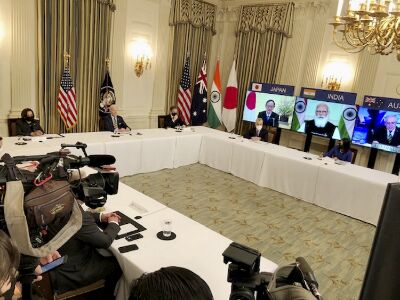A growing front

With its first leader-level meeting, the Quad went from being a simple on-and-off forum to an actual regional grouping. A joint statement was made and even a Washington Times op-ed was jointly penned by all four leaders on the spirit of the Quad. Three critical early areas of cooperation were identified. First, a group of vaccine experts would devise an implementation plan for the distribution of billion vaccine doses to Southeast Asia by the end of 2022. These vaccines would be produced in India but jointly financed by all the Quad members.
A second and third working group would be formed for cooperative action on climate change and critical and emerging technologies. The leaders stated that they would meet again before the year's end to carry the agenda forward.
Even though the Quad is now expanding its agenda, it doesn't mean its primary agenda is diminished in any way. The primary focus of Quad was and still is a free Indo-Pacific region, an assertion that while not directly targeting China, does imply it to be a major part of this principle concern.
It is in such light that India will not be participating in one but two upcoming large-scale naval exercises in the month of April. These exercises will be part of a Quad plus effort to expand participation in the activities of the Quad. The first of these exercises would be the French-led La Perouse exercise in the Bay of Bengal. These exercises have long been part of close Indo-French ties but would also involve the other Quad nations this time. During the exercises, submarines, guided-missile destroyers, frigates and surveillance aircrafts will engage in maneuvers such as formation sailing, live firing, search and rescue, etc.
Also within the month of April, India and France will be joined by the UAE for the Varuna exercises in the Persian Gulf and Gulf of Oman. The region being a strategically sensitive and significant one, these exercises will go a long way in sending a message.
And what about the party receiving the message? China has been fuming for some time over the strong revival of the Quad. It has taken to snidely referring to the Quad as an 'Asian-NATO'. It has used a variety of its media mouthpieces to attack the ideas behind the Quad and in recent weeks has particularly attacked Indian participation in the body. India, as China would put it, is risking its stance of international moderation by heavily leaning towards America's anti-China agenda which would not be in its own best interests. This is a stance that is mirrored by India and China's mutual friend Russia which is also of the opinion that India should not participate in the Quad for the sake of its own sovereignty.
It is true that India, like Australia, was initially reluctant to throw its weight behind Quad for the fear of unnecessarily antagonising China, but times have changed. Both nations have found more cause to be concerned with Chinese actions in their vicinity and be strongly united with like-minded nations that are concerned with China's aggressive growth which contradicts its own assertion of peaceful growth. The Quad affords each of the individual nations under it the capacity to keep China in check without being overwhelmed. It should be interesting to now see how China responds to a Quad that has not only revived but also been expanded. Will China increase its aggression in the region as a knee-jerk response? Seek its own friendly groupings? Or will it react with caution and realise that it is its own openly aggressive and suggestive actions that are driving the Quad nations together.



